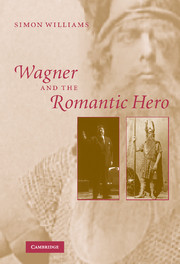Book contents
- Frontmatter
- Contents
- Acknowledgments
- Note on abbreviations of sources
- Introduction
- 1 Modes of heroism in the early nineteenth century
- 2 Wagner and the early nineteenth-century theatre
- 3 Early music-drama: the isolated hero
- 4 Heroism, tragedy, and the Ring
- 5 The last music-dramas: toward the messiah
- 6 Wagner's heroism on stage
- Notes
- Bibliography
- Index
2 - Wagner and the early nineteenth-century theatre
Published online by Cambridge University Press: 22 September 2009
- Frontmatter
- Contents
- Acknowledgments
- Note on abbreviations of sources
- Introduction
- 1 Modes of heroism in the early nineteenth century
- 2 Wagner and the early nineteenth-century theatre
- 3 Early music-drama: the isolated hero
- 4 Heroism, tragedy, and the Ring
- 5 The last music-dramas: toward the messiah
- 6 Wagner's heroism on stage
- Notes
- Bibliography
- Index
Summary
For Wagner, the arts had a heroic purpose. His belief in theatre and music as agencies that allow us to free ourselves from the circumscriptive and corrupting conditions of everyday living was the overriding intellectual preoccupation of his life and the central concern of his major theoretical and critical writings. His vision of theatre's power to transform audiences grew from his impatience with the all-prevailing mediocrity he discovered in the smaller German opera companies where he began his career as a conductor in the 1830s. It was intensified by his stay in Paris, when he came to the conclusion that the most influential theatre in Europe was dominated by routine, egotistical display, shallowness, and indifference to artistic worth. What he saw in Paris was theatre devoted solely to commercial gain; what he came to envision was theatre released from all financial obligation, a place where individuals could achieve freedom by seeing works that led them to understand how they are part of a natural community, a community of the folk. This conception of theatre germinated during his years in Dresden and came to maturity in the great essays written during his first years of exile in Switzerland.
THEATRE AND FREEDOM
Wagner's critique of contemporary opera underwent few modifications in his lifetime. In his earliest essays, we find him complaining that artists have lost touch with their public, that no one knows how to give life to the voice of the folk on stage, and that librettists cannot instill their works with a poetry that provides the dramatic figures with an “organic core of life.”
- Type
- Chapter
- Information
- Wagner and the Romantic Hero , pp. 20 - 36Publisher: Cambridge University PressPrint publication year: 2004



